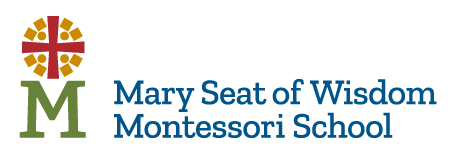“When a child is given a little leeway, he will at once shout, 'I want to do it!’ But in our schools, which have an environment adapted to children’s needs, they say, ‘Help me to do it alone.”
Maria Montessori
Our mission is to provide an authentic Catholic Montessori education, rooted in an encounter with Jesus, to enable the full flourishing of the child—soul, heart, mind, and body—so they may bring Christ’s light to the world.
Mary Seat of Wisdom Montessori was founded in 2017. Our roots stretch back to Immaculate Heart of Mary Montessori, which was founded and operated by Mrs. Marie Sherman from her home. When Mrs. Marie left to be close to her grandchildren, she entrusted the many Montessori materials she had accumulated over the years to MSW to ensure the availability of Catholic Montessori education in Steubenville and the surrounding areas. Located at Sacred Heart Villa, MSW continues the long tradition of Catholic preschool and kindergarten begun by the Handmaids of Reparation of the Sacred Heart of Jesus who educated several generations of Steubenville Catholics.
